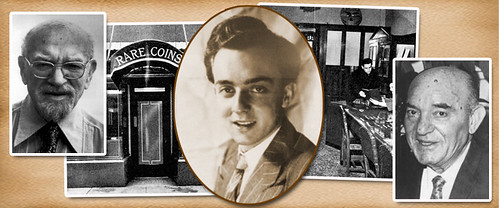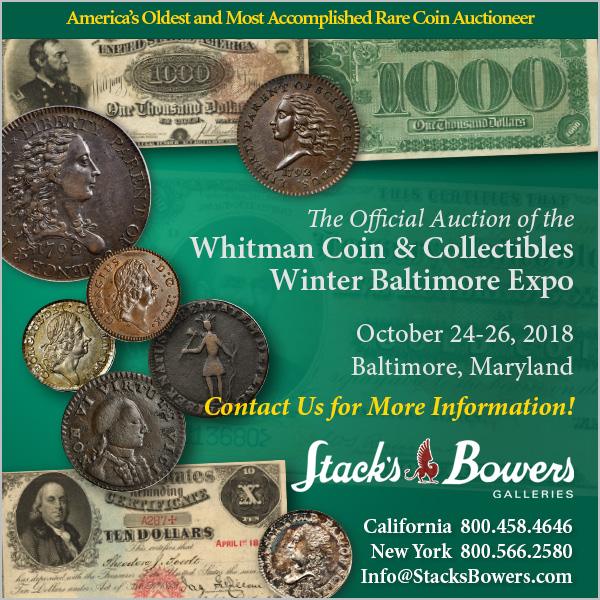
PREV ARTICLE
NEXT ARTICLE
FULL ISSUE
PREV FULL ISSUE
Harvey Stack's blog series focuses on growing up in a numismatic family. Here's part 27. Nothing beats a report on numismatic events and personalities
direct from someone who was there to witness them in person. Thanks, Harvey! -Editor
 More collectors continued to be attracted to numismatics in 1959. The price for Proof sets and Mint sets of this year remained close to face value at the Mint. Speculation in these sets went on. Old time collectors bought these sets from the Mint or from a dealer like Stack’s in order to keep their collections up to date, while at the same time acquiring the other coins they needed for their growing collections. Young collectors searched through their change to fill the popular 25¢ boards. They would then have to find the scarce and rare dates to fill the albums, which led to more advanced collecting. Dealers maintained a general stock for beginners as well as providing scarce and rare dates and mints to more advanced collectors. Quite a few stores evolved, of every type from small local hobby shops to advanced dealers like our company. The market seemed to flourish as collections grew, benefiting from old time collections that were sold as collectors lost interest, moved on to something new, or passed away. Stack's had been around for a quarter of a century and our firm had built friendships and provided services to a good number of the collectors who had been in the hobby since the early 1930s. Our company was also lucky to obtain, with many of the cabinets we sold, the libraries collectors had built and used for reference as they developed their collections. Our library grew so that it had to be housed on two different floors, the United States portion on the first floor and the foreign and ancient library on the second. We made our library available for use by collectors and they often became friends as they developed in the hobby. The use of the library, the other services we offered, and the relationships we built caused Stack’s to be selected to buy and sell for these collectors. My uncle Joe (Joseph B. Stack) used to say to many who came to visit: “You know that the coin I just sold you really is on loan to you, for someday I hope to get it back to sell to another collector.” All who heard that remark used to laugh, but it did sum up an important role we played in the market and gave buyers an idea for what they could do in the future. In 1955, in order to help my uncle sell at auction, both Ben and I had become licensed Public Auctioneers, and were given the chance to sell whenever my uncle tired on the stand. One of the earliest sales I remember auctioneering was at a New England Numismatic sale in Hartford in 1957. For this event I took several members of our staff, together with the coins to be sold, and performed the whole sale myself. My uncle’s training provided the skills needed to be a Public Auctioneer, and I was proud to have been able to perform this auction all on my own without any mishaps. Stack’s auction season for 1959 included the Pelletreau Collection, the T.K. Harvin Collection, the Philip Straus Collection, the Thetford Collection, the Wilson Reuter Collection and the Powers Collection.. The Pelletreau Collection, at the time owned by Robert Pelletreau of Long Island, had been started by his father in the depression years of 1933-1934. Robert's father was a lawyer who was established in Patchoug, Long Island. After his father passed away Robert continued as a lawyer in the area, and worked on his father's collection on weekends. Robert would travel to New York City about once a month, on the Long Island Rail Road, and spend several hours visiting Stack's, with my father Morton always helping him. The collection grew and became very comprehensive. His father had bought some of the coins from dealers like B. Max Mehl and Wayte Raymond, and later many came from Stack's as we became a source for additions. The Robert Pelletreau Collection of primarily copper, silver and gold coins had many scarce and rare coins that also offered important pedigrees. It was complete in the minor issues, and featured rarities and high quality. Included was an 1876-CC twenty-cent piece as well as half dollars of 1795 (3 leaf), 1796, 1797, 1838-O, 1878-S, and an 1884 trade dollar, along with many other coins, mostly in Proof or Mint State. In my next article I will tell of some of the other collections that crossed the block at Stack’s in the last year of the 1950s. To read the complete article, see:  Wayne Homren, Editor The Numismatic Bibliomania Society is a non-profit organization promoting numismatic literature. See our web site at coinbooks.org. To submit items for publication in The E-Sylum, write to the Editor at this address: whomren@gmail.com To subscribe go to: https://my.binhost.com/lists/listinfo/esylum All Rights Reserved. NBS Home Page Contact the NBS webmaster 
|